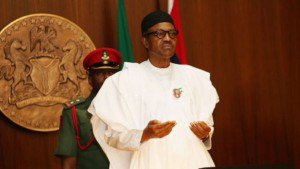From Isaac Anumihe, Amaka Agu and Anita Acka, Abuja
President Muhammadu Buhari yesterday said that payment to contractors would only be made upon proof of tax payment, assuring that growth without development would no longer be part of the nation’s political economy.
Speaking when he declared open the 18th Annual Tax Conference in Abuja, Buhari said the Federal Government would collaborate with the Federal Inland Revenue Service (FIRS) before payment is made to any contractor. He attributed the low revenue yield to a number of factors including corruption and wastage in the economy.
The president who was represented by the Minister of Finance, Mrs. Kemi Adeosun, noted that a robust tax system is a sine qua non to any growing economy, adding that the Federal Government plans to engage with relevant members of the National Assembly to ensure that required revisions, amendments and new laws can be passed expediently to keep pace with the rapid change in business practices.
The President admitted that, “an overhaul of our tax code is long overdue as is the redrafting of our tax laws to reflect current business practices and new trends. We must respond to the growing phenomenon of base shifting and other practices that allow companies to evade their fiscal and legal responsibilities.”
He further stated: “We will critically examine our GDP to align taxes with economic activity in our bid to block all leakages. For example, the multi-billion naira losses being identified in our solid minerals sector by illegal and undocumented miners will be addressed with increased formalisation and review of the governing laws. Indeed, we are committed to the continuous improvement of our tax system as part of a dynamic framework. We will use tax administration and technology to widen compliance and encourage more individuals and companies into the tax net,” adding that “the Federal Government is already investing in technology to boost the efficiency of our collections.”
In her remarks, President of Chartered Institute of Taxation of Nigeria (CITN), Dr. Olateru Abiola Somorin, called for a review of Nigeria’s tax laws if the country hopes to rake in substantial revenue from taxation.
She said that sustainable economic growth cannot be attained without review of obsolete tax law, adding that the institute has always been in the vanguard of calls for the review.
“Our tax laws must be enablers for voluntary tax compliance and not discourage same. Our tax laws must also be devoid of ambiguities and not give room for either the tax payers or tax administrators to interpret same in an inconsistent manner,” she noted.
Somorin observed that despite growth in terms of Gross Domestic Product (GDP) the nation’s tax-GDP ratio has only managed a dismal 7 per cent compared to 20.8 per cent in Ghana, 15.4 per cent in Benin Republic, 18.2 per cent in Cameroon, 23.2 per cent in Cape Verde, 15.3 per cent in Code d’Ivoire, 15.8 per cent in Egypt and 26.9 per cent in South Africa.
Citing the International Monetary Fund’s (IMF)’s report released last Monday, which stated that the growth forecast for this year represents the lowest for the region in the past 15 years, the institute’s boss attributed the situation to the development to severe shocks, including weak commodity prices, tight external financing and drought.
“The report called for a stronger policy response to counter the effect of these shocks and secure the region’s growth potential. The report, however, indicated that the impact of these shocks varies significantly across the region as many countries continue to register robust growth, including in per capita terms.”
However, Somorin expressed optimism that the economy would soon be revived as PricewaterhouseCoopers has projected that Nigeria’s GDP would hit $6.4 trillion by 2050.
“The report added that when this is achieved, Nigeria will move to the 9th position on the world ranking and will probably surpass developed countries like France, Germany and the United Kingdom. We need to diversify Nigeria’s over-dependence on oil to achieve this feat. Nigeria has to transit essentially to a non-oil economy.”
Earlier, the Accountant General of the Federation (AGF), Ahmed Idris, who was represented by Suberu Salau, said that in an attempt to restore the economy to buoyancy, the Federal Government has embraced taxation as a major source of funding the budget.

